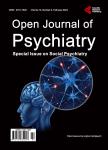Effect of Antenatal Depression on Fetal Growth Outcomes at the Jos University Teaching Hospital Jos, Plateau State, Nigeria
Effect of Antenatal Depression on Fetal Growth Outcomes at the Jos University Teaching Hospital Jos, Plateau State, Nigeria作者机构:Department of Psychiatry Jos University Teaching Hospital Jos Nigeria Department of Psychiatry Aminu Kano University Teaching Hospital Kano Nigeria Department of Psychiatry College of Health Sciences Benue State University Makurdi Nigeria Department of Family Medicine Jos University Teaching Hospital Jos Nigeria
出 版 物:《Open Journal of Psychiatry》 (精神病学期刊(英文))
年 卷 期:2022年第12卷第4期
页 面:336-344页
学科分类:1002[医学-临床医学] 100211[医学-妇产科学] 10[医学]
主 题:Depression Antenatal Depression Fetal Weight Fetal Growth Rate Birth Weight
摘 要:Background: Depression is the most prevalent psychiatric disorder in pregnancy and it is associated with psychosocial and obstetric factors. Studies have shown that pregnancy does not prevent women from becoming depressed;rather, it may be a time when depression occurs for the first time in some women. Antenatal depression has been identified as a risk factor for post natal depression, adverse obstetric outcomes, poorer neonatal outcomes and higher growth retardation in infants. Purpose: This study aimed to determine the fetal growth outcomes among depressed pregnant women in their third trimester attending antenatal clinic at the Jos University Teaching Hospital (JUTH), Jos, Plateau State, Nigeria. Method: A prospective cohort study design was used to assess 514 women who consented to the study (256 cases and 258 controls). A socio-demographic questionnaire was given to the women to fill out the study entry. Edinburgh Post Natal Depression Scale (EPDS) was used to screen for depression and MINI neuropsychiatric interviews were used to diagnose depression in those women found to be at risk of depression using the EPDS. Ultrasonography was used to determine the fetal weight in the third trimester of pregnancy. The birth weight of the babies born to the women was obtained from the birth register in the labor ward and the fetal growth rate was calculated from the estimated fetal weight on ultrasound scan in late pregnancy and the birth weight of babies. Result: The mean fetal weight in the third trimester for non-depressed women was slightly higher than in depressed women though the difference was not statistically significant (P = 0.431). The difference in the mean calculated fetal growth rate for fetuses of non-depressed women in the third trimester was statistically significantly higher than in depressed women (p = 0.000). Depressed women also had babies with lower birth weight than non-depressed women and the difference was statistically significant (p = 0.00).



